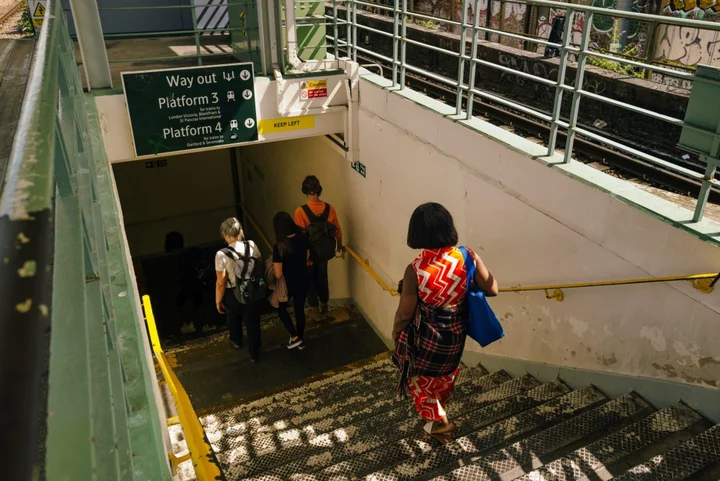Britain’s train network is being hit by further disruption as rail workers mark the end of the summer holidays with another strike.
Train drivers represented by the Aslef union walked out Friday, leading to cancellations on 16 rail companies across the country, in a long-running dispute over pay. Disrupted routes include services into central London such as c2c, Southeastern and Southern, as well as the Gatwick Express line to the airport south of the capital.
As little as 7% of desks in central London are expected to be occupied as more staff choose to work from home, according to Freespace, a company that monitors workplace data. Fridays are normally sparse, with occupancy little above 10% at the end of last week partly due to the holiday season.
The strikes are expected to drag into the weekend, with as many as 20,000 RMT members striking on Sept. 2 across 14 train companies, threatening travel chaos for passengers returning from vacation and football supporters traveling to matches.
Aslef has also imposed an overtime ban on Sept. 2.
Doctors
Britain has suffered its worst spell of industrial unrest since the 1980s since inflation soared over a year ago. While many disputes have been settled in recent months, two prominent groups remain a headache for Prime Minister Rishi Sunak: rail workers and doctors. Senior consultants and junior doctors will strike together for four days in the coming weeks, including three days during the Conservative party’s annual conference.
The British Medical Association said Thursday that junior and senior doctors would walk out together on Sept. 20 and Oct. 2-4, adding to other days on which the groups are protesting separately. Their dispute also concerns pay.
Meanwhile, RMT General Secretary Mick Lynch wrote to the Rail Delivery Group last week with a proposed “road map” toward a settlement. The labor group remains in dispute over the size of proposed pay hikes and changes to working conditions. Aslef is demanding higher pay for drivers.
Train companies and ministers say the rail network needs urgent reforms to adapt to post-Covid changes in passengers’ habits. Workers point to Britain’s stubborn rate of inflation which has eroded wages and sharply increased living costs.
The latest industrial action is “deliberately designed to target passengers” and will be “disrupting their plans, hurting local economies and forcing more cars onto the road,” a spokesperson for the RDG said.
The lack of progress on a new pay offer “shows the contempt in which the companies, and the government, hold passengers and staff and public transport in Britain,” said Mick Whelan, Aslef’s general secretary.
(Updates with details of doctors’ strike in sixth and seventh paragraphs.)

